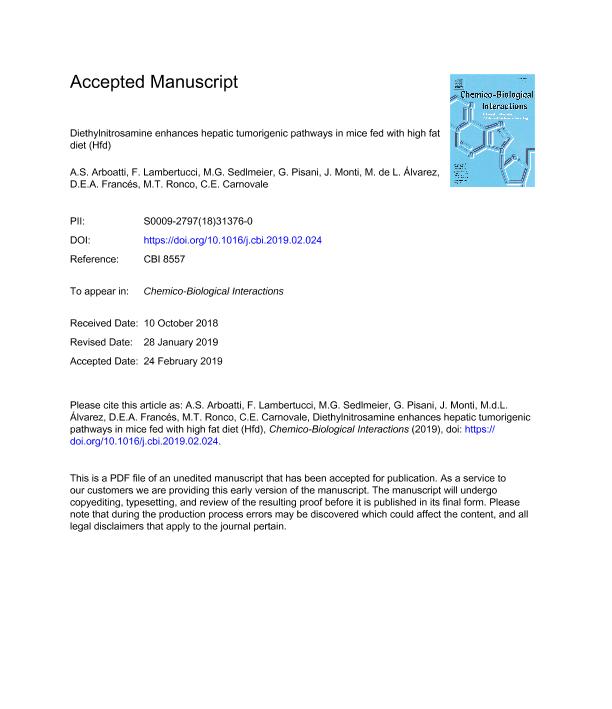Artículo
Diethylnitrosamine enhances hepatic tumorigenic pathways in mice fed with high fat diet (Hfd)
Arboatti, Ainelén Soledad ; Lambertucci, Flavia
; Lambertucci, Flavia ; Sedlmeier, María Guillermina
; Sedlmeier, María Guillermina ; Pisani, Gerardo Bruno; Monti, Juan Alberto; Alvarez, María de Luján
; Pisani, Gerardo Bruno; Monti, Juan Alberto; Alvarez, María de Luján ; Frances, Daniel Eleazar Antonio
; Frances, Daniel Eleazar Antonio ; Ronco, Maria Teresa
; Ronco, Maria Teresa ; Carnovale, Cristina Ester
; Carnovale, Cristina Ester
 ; Lambertucci, Flavia
; Lambertucci, Flavia ; Sedlmeier, María Guillermina
; Sedlmeier, María Guillermina ; Pisani, Gerardo Bruno; Monti, Juan Alberto; Alvarez, María de Luján
; Pisani, Gerardo Bruno; Monti, Juan Alberto; Alvarez, María de Luján ; Frances, Daniel Eleazar Antonio
; Frances, Daniel Eleazar Antonio ; Ronco, Maria Teresa
; Ronco, Maria Teresa ; Carnovale, Cristina Ester
; Carnovale, Cristina Ester
Fecha de publicación:
04/2019
Editorial:
Elsevier Ireland
Revista:
Chemico-biological Interactions
ISSN:
0009-2797
Idioma:
Inglés
Tipo de recurso:
Artículo publicado
Clasificación temática:
Resumen
Obesity has been implicated in the genesis of metabolic syndromes including insulin resistance and Type 2 Diabetes Mellitus (T2DM). Given the association between T2DM and the risk of hepatocellular carcinoma (HCC), our specific goal was to determine whether the liver of HFD-induced T2DM mice is more sensitive to the carcinogen diethylnitrosamine (DEN), due to a modification of the molecular pathways implicated in the early stages of HCC pathogenesis. C57BL/6 male mice (five-week-old) were divided into 4 groups: C, C + DEN, HFD and HFD + DEN. Mice were euthanized twenty-five weeks after DEN-injection. Livers of HDF-fed mice showed a higher proliferative index than Control groups. In line with this, HFD groups showed an increase of nuclear β-catenin, and interestingly, DEN treatment led to a slight increase in the expression of this protein in HFD group. Based on these results, and to confirm this effect, we analyzed β-catenin target genes, finding that DEN treatment in HFD group led to a significant increase of Vegf, c-myc, c-jun and cyclin D1 expression levels. According to our results, the expression of TCF4 showed to be significantly increased in HFD + DEN vs. HFD. In this regard, the β-catenin/TCF4 complex enhanced its association with pSmads 2/3, as we observed an increase of nuclear Smads expression in HFD + DEN, suggesting a possible role of TGF-β1/Smads signaling pathway in this phenomenon. Our results show that the liver of HFD fed model that resembles early T2DM pathology in mice, is more sensitive to DEN, by inducing both Wnt/β-catenin and TGF β1/Smads tumorigenic pathways.
Archivos asociados
Licencia
Identificadores
Colecciones
Articulos(IFISE)
Articulos de INST.DE FISIOLOGIA EXPERIMENTAL (I)
Articulos de INST.DE FISIOLOGIA EXPERIMENTAL (I)
Citación
Arboatti, Ainelén Soledad; Lambertucci, Flavia; Sedlmeier, María Guillermina; Pisani, Gerardo Bruno; Monti, Juan Alberto; et al.; Diethylnitrosamine enhances hepatic tumorigenic pathways in mice fed with high fat diet (Hfd); Elsevier Ireland; Chemico-biological Interactions; 303; 4-2019; 70-78
Compartir
Altmétricas



